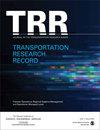巴士司机和乘客在巴士冲突中的愤怒表情
IF 1.8
4区 工程技术
Q3 ENGINEERING, CIVIL
引用次数: 0
摘要
公交车司机和乘客之间或乘客之间经常发生冲突,导致驾驶过程中的危险情况。然而,目前还缺乏探索司机和乘客愤怒表达方式的工具。本文介绍了基于402名乘客样本和414名司机样本的公共汽车乘客愤怒表达量表(BPAX)和公共汽车司机愤怒表达量表(BDAX)的开发。探索性主成分分析揭示了言语攻击表达、言语积极表达、个人肢体攻击表达、适应性/建设性表达和迁移性攻击五个影响BPAX的因素。同样,在BDAX中确定了六个因素:言语积极表达、使用工具表达愤怒、言语攻击性表达、适应性/建设性表达、个人身体攻击性表达和转移性攻击。总体而言,性别只在乘客愤怒的攻击性表达上存在差异,而在司机的愤怒表达上没有差异。年龄较大、受教育程度较低和收入较低的乘客更喜欢积极地表达愤怒,很少用积极的语言方式来缓解冲突。对于司机群体来说,年龄、愤怒程度和城市等级的差异反映在他们的愤怒表达形式上。本文的研究结果对于加强驾驶员安全培训、完善公交车安全设施、加强乘客文明乘车教育、完善法律法规具有重要意义。本文章由计算机程序翻译,如有差异,请以英文原文为准。
Anger Expressions of Bus Drivers and Passengers during Conflicts on the Bus
Conflicts often occur between bus drivers and passengers or among passengers, leading to dangerous situations while driving. However, tools to explore drivers’ and passengers’ forms of anger expression are lacking. This paper describes the development of a bus passenger anger expression inventory (BPAX) and a bus driver anger expression inventory (BDAX) based on a 402 passenger sample and a 414 driver sample. Exploratory principal component analysis revealed five factors in the BPAX: verbal aggressive expression, verbal positive expression, personal physical aggressive expression, adaptive/constructive expression, and displaced aggression. Similarly, six factors were identified in the BDAX: verbal positive expression, use of the vehicle to express anger, verbal aggressive expression, adaptive/constructive expression, personal physical aggressive expression, and displaced aggression. Overall, gender showed a difference only in aggressive expressions of passenger anger, not in drivers’ anger expressions. Older, less educated, and lower-income passengers preferred to express anger aggressively and rarely relieved conflicts in a positive verbal way. For driver groups, differences in age, anger level, and city grade were reflected in their forms of anger expression. The results of this paper are significant for strengthening driver safety training, improving safety facilities in buses, enhancing passenger education on civilized riding, and perfecting laws and regulations.
求助全文
通过发布文献求助,成功后即可免费获取论文全文。
去求助
来源期刊

Transportation Research Record
工程技术-工程:土木
CiteScore
3.20
自引率
11.80%
发文量
918
审稿时长
4.2 months
期刊介绍:
Transportation Research Record: Journal of the Transportation Research Board is one of the most cited and prolific transportation journals in the world, offering unparalleled depth and breadth in the coverage of transportation-related topics. The TRR publishes approximately 70 issues annually of outstanding, peer-reviewed papers presenting research findings in policy, planning, administration, economics and financing, operations, construction, design, maintenance, safety, and more, for all modes of transportation. This site provides electronic access to a full compilation of papers since the 1996 series.
 求助内容:
求助内容: 应助结果提醒方式:
应助结果提醒方式:


